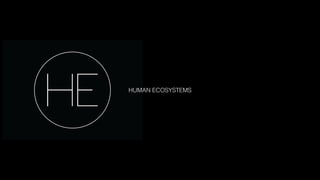Human ecosystems gather public conversations from social networks to analyze citizens' thoughts and emotions, providing real-time open data back to civil society. This initiative, currently active in cities like Rome and São Paulo, aims to enhance understanding of communities and foster innovation through collaborative services. By connecting ecosystems globally, it promotes sharing of knowledge, best practices, and cultural insights through various challenges and events.















